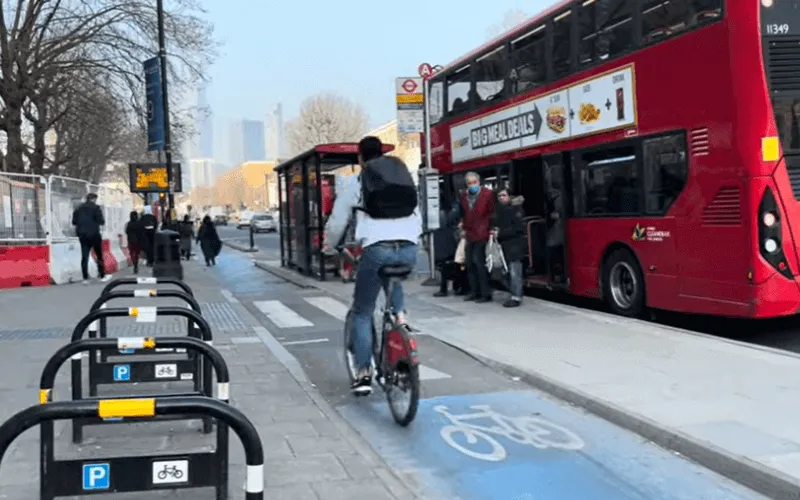Disabled campaigners have expressed their frustration with ministers after they imposed a “pause” on the most dangerous types of “floating” bus stop but refused to halt the rollout of all such installations.
The National Federation of the Blind of the UK (NFB UK) is among disabled people’s organisations that have campaigned for years to highlight the risks of floating bus stops, particularly to blind and partially-sighted bus-users.
The charity has warned that such infrastructure is “not safe or accessible for blind and visually impaired pedestrians,” and that the designs are “discriminatory”.
It has previously pointed out that the Equality Act has “failed to protect blind, deafblind and visually impaired bus passengers, as well as many other disabled and vulnerable bus passengers from unsafe bus stops”, which it said was “nothing short of a national scandal”.
The announcement of a pause was made by transport minister Simon Lightwood during debate in the committee stage of the bus services (no 2) bill last Thursday.
The government has also promised to issue guidance on the design of floating bus stops within three months of the bill becoming law, but it has ruled out banning all floating bus stops because it believes that could put the safety of cyclists at risk.
Lightwood said the government recognised that “more needs to be done to make these installations accessible to all”.
He said this was why ministers had decided to “instigate a pause on designs [in England] where passengers board and alight directly into a cycle track shared between pedestrians and cyclists”.
These bus stops are known as “shared used bus boarders”, and they expose passengers to the risk of crossing cycle lanes when either boarding or leaving a bus.
But campaigners, including many who are blind and partially-sighted, have also been calling for years for the government to ban the “bus stop bypass” type of stop (pictured), where a cycle lane is routed behind the bus stop, creating a bus stop “island”.
This type of floating bus stop also creates significant risks of collisions with cyclists for pedestrians, particularly those who are blind or partially-sighted, and, NFB UK said this week, “renders bus services inaccessible for blind people”.
Lightwood added later in the debate: “This government do not believe that a complete ban on [all] floating bus stops is appropriate, given the need to improve safety for cyclists and to enable more people to cycle.
“The requirement to publish statutory guidance, to which local authorities are required to have regard, will enable the government to set out clearly what is expected of authorities in terms of making floating bus stops accessible.”
Andrew Hodgson, an NFB UK executive council member, said: “We are very disappointed about the outcome following debate in the House of Lords and at committee stage (in the Commons).
“We had hoped for a total ban on future bus-stop bypasses of all types and that all of the existing ones would be taken out.
“We feel that the proposed review of bus-stop bypass design is flawed, as the very people who have installed them will be assessing their future design.”
But the government’s actions were also thrown into confusion when it emerged that the previous week, in answering an oral question in the House of Commons, Lightwood had appeared to promise to pause the installation of both kinds of floating bus stop.
He had told Conservative MP David Reed that ministers had committed to “writing to all local transport authorities asking them to pause the installation of a specific kind of floating bus stop, where passengers get off the bus straight into a cycle lane or an island”.
The Department for Transport told Disability News Service yesterday (Wednesday) that the government would only be pausing shared used bus boarders, but the department had refused to say by noon today if the minister would apologise for his blunder.
Picture taken from an NFB UK video
A note from the editor:
Please consider making a voluntary financial contribution to support the work of DNS and allow it to continue producing independent, carefully-researched news stories that focus on the lives and rights of disabled people and their user-led organisations.
Please do not contribute if you cannot afford to do so, and please note that DNS is not a charity. It is run and owned by disabled journalist John Pring and has been from its launch in April 2009.
Thank you for anything you can do to support the work of DNS…

 Inaccessible transport is a growing barrier to enjoying live sport for disabled fans, survey finds
Inaccessible transport is a growing barrier to enjoying live sport for disabled fans, survey finds Ministers listen to disabled campaigners and return key accessibility duty to railways bill
Ministers listen to disabled campaigners and return key accessibility duty to railways bill Coach firm to pay thousands to accessible transport activist after driver lied that he threatened violence
Coach firm to pay thousands to accessible transport activist after driver lied that he threatened violence